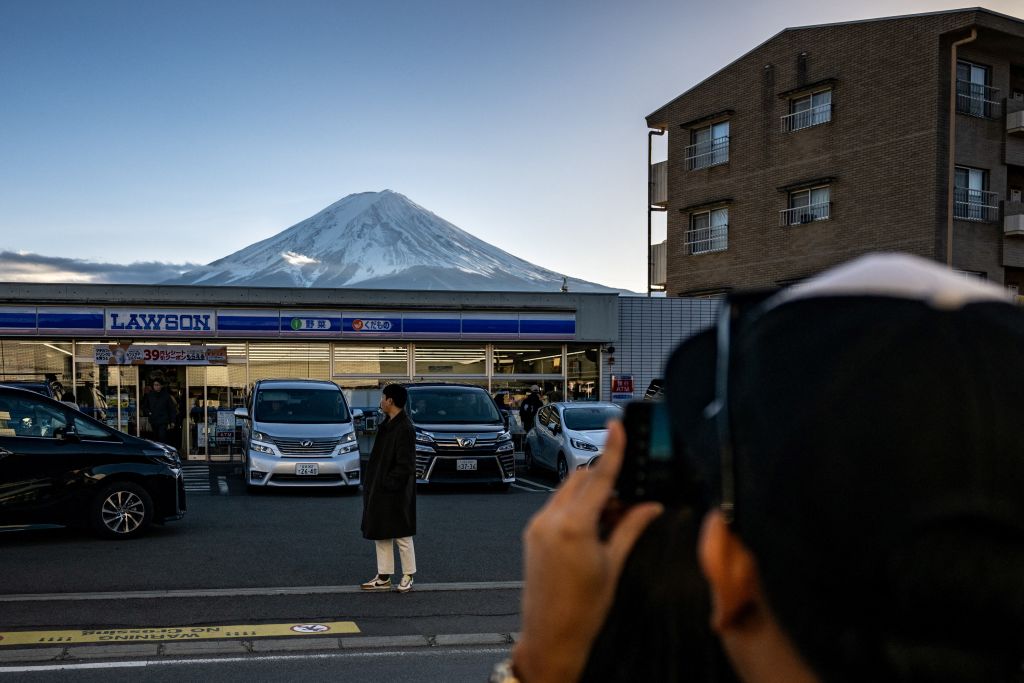

A Japanese Town, Frustrated by Overtourism, Is Blocking Its Instagram-Famous View of Mt. Fuji
For months, Fujikawaguchiko, a Japanese resort town, has been swarmed with tourists eager to soak in the views of Mount Fuji, the country’s tallest mountain. The visitors have also taken a particular interest in one specific parking lot, which offers a picturesque view of the famed volcano in the background of a convenience store.
[time-brightcove not-tgx=”true”]
As the spot surged in popularity after earning a reputation on social media for being “very Japanese,” a local official told AFP, throngs of tourists have wreaked havoc, sometimes parking their cars without permission, leaving litter behind, and even climbing onto the roof of a nearby dental clinic in hopes of a better vantage point for the perfect shot.
Now, residents of Fujikawaguchiko are taking matters into their own hands, armed with plans to install a big barrier to block the view of the mountain. As early as next week, construction will begin for a mesh net measuring 2.5 meters (8 feet) high and 20 meters (22 yards) long.
“It’s regrettable we have to do this, because of some tourists who can’t respect rules,” the official said, adding that the screen will stay in place until the situation eases.
The announcement comes as Japan, which was already grappling with overtourism before the pandemic, is increasingly desperate to rein in rowdy visitors amid record tourism numbers. In March, monthly visitors crossed the three million mark for the first time, while tourist expenditure in the first quarter of 2024 also set a new record at 1.75 trillion yen (over $11 billion).
Last month, Kyoto authorities banned visitors from walking around the famed narrow alleyways of its geisha district in Gion, after tourists were reported photographing and touching the kimonos of traditional entertainers despite signs warning them to refrain from doing so.
And earlier this year, Yamanashi, the prefecture where many hikers begin their ascent of Mount Fuji announced that they would start charging ¥2,000 ($13) entry fee for those climbing the mountain—an attempt to curb congestion on the trails.
Across the world, the revival of tourism has helped give a massive boost to local economies, but also brought headaches to local communities. This week, Venice rolled out an experimental policy to charge day visitors a fee to access the historic city center, and the Indonesian island of Bali started imposing a tourist tax at the start of this year.
Get the latest work and career updates delivered straight to your inbox by subscribing to our magazine category today. Stay informed and ahead of the game with Subscrb.
The content on this website has been curated from various sources and is for informational purposes only. We do not claim ownership of any of the content posted here, all rights belong to their respective authors. While we make every effort to ensure that the information is accurate and up-to-date, we cannot guarantee its completeness or accuracy. Any opinions or views expressed on this website are solely those of the original authors and do not necessarily represent our own. We do not endorse or take responsibility for the content or actions of external websites or individuals linked from this website. Any reliance on the information provided on this website is done at your own risk. Please note that this article was originally seen on the source website TIME, by the author Koh Ewe
-
SALE!




Forbes Asia Magazine Subscription
From: RM220 / year -
SALE!


Fortune Magazine Subscription
From: RM118 / year -
OUT OF STOCK




The Economist Magazine Subscription
From: RM1530 / year -


Inc. Magazine Magazine Subscription
From: RM22 / year -


Consumer Reports Magazine Subscription
From: RM22 / year -


Harvard Business Review Magazine Subscription
From: RM83 / month -


Entrepreneur’s Startups Magazine Subscription
From: RM4 / year -


BILLIONAIRE Magazine Subscription
From: RM131 / year



